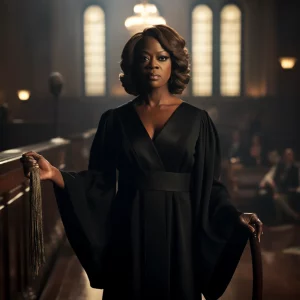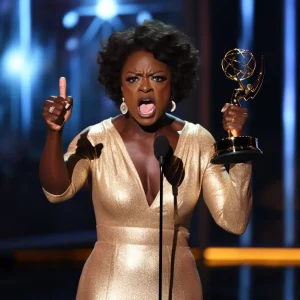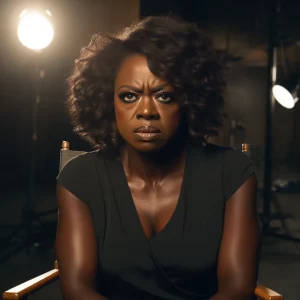Viola Davis is one of the most acclaimed actresses of her generation, renowned for delivering powerful and nuanced performances across film, television, and theatre. Her interviews over the years have provided fascinating insights into her illustrious career, activism, and personal life.
Davis possesses an uncanny ability to inhabit complex characters that showcase the full spectrum of human experience. Her interviews offer a glimpse into her intense acting process and complete immersion into each role she plays. She discusses developing a profound understanding of a character’s psychology and emotional landscape in order to embody their essence.
Beyond her extraordinary talents as a performer, Davis utilizes her wide-reaching platform to advocate for issues regarding race, gender equality, and inclusion in the entertainment industry. Her outspoken presence in interviews underlines her firm commitment to promoting diversity and uplifting marginalized voices across society.
Additionally, Davis’ interviews allow audiences to connect with her inspirational life story – one characterized by tremendous resilience, courage, and determination. She emerged from a childhood spent in poverty and distress to become one of the most impactful actresses of our time, breaking barriers and paving the way for other artists.
The Importance of Celebrity Interviews
Celebrity interviews serve a vital role in providing the public with an intimate look at the personal experiences, beliefs, and opinions of renowned cultural figures. They offer more than just entertainment and publicity – they can shape attitudes, spur social discourse, and positively impact society.
Insight into Personalities
By candidly answering questions, celebrities humanize themselves in the eyes of their fans. Interviews offer a window into understanding celebrities beyond their public persona and on-screen roles. Audiences gain perspective into their struggles, triumphs, passions, relationships and what truly drives them.
Promotion and Publicity
Interviews fuel anticipation and coverage for upcoming creative projects and professional ventures. They are a vital publicity platform for promoting artists’ work and maintaining engagement with fans and media outlets alike.
Platform for Expression
Interviews allow celebrities to raise awareness on sociopolitical issues, support charitable causes close to their heart, or connect with communities they represent. They can utilize their influential voice and far reach to drive real impact.
Viola Davis’ Journey
Childhood and Background
Davis was born in 1965 in St. Matthews, South Carolina into extreme hardship and distress. She grew up in crushing poverty, often enduring hunger and living in condemned homes plagued by rat infestations. Her family struggled with keeping the lights on, affording basic amenities and overcoming food scarcity on a daily basis. Davis faced traumatic racism within her community and school, getting tormented by white peers solely due to the color of her skin.
As a means of escape, Davis often found solace at her local library, voraciously reading any book she could get her hands on. Literature and stories quickly became a treasured refuge from the turmoil surrounding her. By eighth grade, after catching a riveting performance of the Glass Menagerie play, Davis vividly remembers discovering her early passion for the craft of acting. She immersed herself in school plays and skits, awakened by the sheer joy performing brought her.
Davis went on to attend Rhode Island College, graduating in 1988 before gaining acceptance into the prestigious Juilliard School to further hone her dramatic skills. The competitive Juilliard acting program afforded Davis both endless creative inspiration and priceless mentorship opportunities to develop her talents.

Breakthrough Roles
Early in her career, Davis played minor transient roles in various television and film projects as she navigated the intricacies of the entertainment industry. Her skills were apparent but the meaningful, meatier parts escaped her grasp for years. Davis’ big break arrived in 1996 when she earned career-making acclaim for her supporting turn in the critically celebrated drama “The Shrink Next Door.”
Davis’ star steadily rose through the early 2000s through praiseworthy performances in films like “Antwone Fisher”, “Out of Sight” and “Far from Heaven.” She achieved more mainstream fame in 2008, playing Mrs. Miller, the resilient, unwavering mother in the legal drama “Doubt” opposite heavyweight Meryl Streep. Davis earned her first Oscar nomination for the role, affirming her arrival as a heavyweight dramatic talent in Hollywood after her decades-long quest for recognition.
Davis garnered more acclaim portraying the stately professor in 2011’s “Extremely Loud & Incredibly Close”, securing her second Oscar nomination. However, her career-defining performance came in the 2011 period drama film “The Help” as the lead character Aibileen Clark, a maid who builds a defiant friendship with a white socialite. Davis’ emotionally charged acting earned massive critical praise, catapulting her to widespread fame and securing various accolades.
Davis made history in 2015 when she received the first Best Actress Oscar nomination for a black woman playing a lead role on a major TV series. Her compelling work as the brilliant and enigmatic defense attorney Annalise Keating in ABC’s hit show “How to Get Away with Murder” cemented her as one of Hollywood’s most talented actresses.

Awards and Recognition
A crowning moment in Davis’ career arrived when she won the Supporting Actress Oscar in 2017 for her heart-wrenching performance in the film adaptation of the August Wilson play “Fences.” Her much-deserved Oscar win established her prominence as an actress with both critical and commercial success.
Davis was bestowed the honor of being the center recipient of the Kennedy Center Honors Award in 2018. The prestigious lifetime artistic achievement award confirmed Davis as a cultural icon. She etched her name in entertainment history the same year by becoming the first black actress to achieve the ‘Triple Crown of Acting’. This momentous title requires competitive wins for an Oscar, Emmy and Tony award over an artist’s career.
Davis was also presented with the 2,572nd star on the iconic Hollywood Walk of Fame in 2017, recognizing her far-reaching impact on Hollywood. Continuing her run of landmarks, she was distinguished in 2022 with the coveted Chaplin Award by the Film Society of Lincoln Center for her excellence in film.
Beyond her acting ability, Davis’ influence as an inspirational figure was acknowledged when Time Magazine named her one of their 100 Most Influential People. As her glowing career continues ascending to extraordinary heights, Davis is already being touted as the rightful successor to Meryl Streep’s crown in possessing generational acting talent and unprecedented professional success.
Significance of Viola Davis’ Interviews
Insights into Her Acting Process
Throughout Davis’ interviews, she often provides treasured nuggets of wisdom into her meticulous creative process for building characters. Davis stresses the paramount importance of wholly diving deep into a character’s emotional inner reality and psyche. She firmly believes an actor must seek out the relatable facets existing between themselves and the role they are assigned to play no matter how different their backgrounds.
Davis praises the value of extensive research and crafting detailed character backstories for further fleshing out and dimensionalizing the fictional figures she inhabits. She collaborates closely with directors to sharpen her understanding of a character’s desires, motivations and vulnerabilities. Davis repetitively runs lines to polish a character’s voice and physicality while workshopping the role extensively before production.
According to Davis, tremendous acting requires embracing all the “messiness” innately present in the contradiction and chaos of being human. Therefore she insists that every character must capture that authenticity and not simply be an overt hero or villain caricature. Davis seeks to tap into and pour her own deep wells of joy and trauma into each performance, conveying acting as an almost spiritual transcendence when fully immersed in a role.
Personal and Professional Growth
Throughout interviews over her decades-long career, Davis has openly charted her evolution from initially only being offered small, unsatisfactory peripheral parts to becoming an acclaimed leading lady taking Hollywood by storm. The limited opportunities for black actresses constrained the early breadth of roles she secured. Davis details lacking dynamic, non-stereotypical multidimensional female characters of color during that era in the industry.
However, Davis emphasizes how her perseverance and patience slowly powered her measurable ascension over time to becoming an award-winning A-list actress and Hollywood’s most sought-after performer. She stresses the bold, risky choices she made, like accepting the role of Annalise Keating in “How to Get Away with Murder” which boosted her widespread popularity exponentially.
Davis imparts wisdom to younger artists on displaying vulnerability and authenticity within performances to achieve resonance and relatability with audiences. She remains dedicated to keep growing her skillset by selecting increasingly complex projects that both petrify and challenge her. Davis credits her indomitable resilience for overcoming stressful situations and traumatic setbacks that arise in Hollywood. Most importantly, she radiates an abundance of grace and humility despite reaching the absolute pinnacle of superstardom – a testament to her strength of character.

Social and Political Activism
Beyond the big screen, Davis maintains a fierce commitment to champion social and political activism as much as possible within the capacity of her far-reaching platform. She remains an outspoken advocate on dismantling Hollywood’s historic marginalization of non-white stories and performers. Davis consistently pushes to increase racial and gender representation both in front of and behind the camera.
Whether discussing issues around racial injustice, inequality and police brutality or speaking out about gender discrimination – Davis leverages her amplified voice to shine an urgent spotlight on such critical issues routinely sidelined. She uplifts and brings exposure to black artists and visionary films gradually making promising strides in the positive direction of inclusion. But Davis still laments the substantial improvements required in how minorities are treated by Hollywood’s creative establishment.
Beyond her acting achievements, Davis’ passion for philanthropy and desire to inspire change manifested in co-founding the non-profit organization Maada with her husband. The mission revolves around designing impactful youth empowerment programs centered on arts education and creative self-expression. Davis also tirelessly utilizes her celebrity status to bring vital awareness to worthy socioeconomic causes like poverty, hunger and access disparities disproportionately plaguing disenfranchised communities.
Viola Davis’ Most Memorable Interviews
Diversity and Representation in Hollywood
Viola Davis does not mince words when discussing diversity and representation in Hollywood. She fiercely argues that the industry has propelled narrow, problematic narratives around race for decades in film and media. Davis highlights gratifying recent progress but believes substantially more work is required for meaningful change. She emphasizes Hollywood’s duty to showcase the panoply of perspectives and experiences across our diverse society. Davis praises the breakthrough of visionary films like “Moonlight” while underscoring the need for continued momentum. Her refreshing candor on such issues underscores her commitment to inclusion.
Experiences as a Black Actress
Davis has faced appalling racism and discrimination on her journey as a dark-skinned black actress. She’s been told she’s not “pretty enough”, classically conditioned ideas that light skin equals beauty. Davis describes only being offered sidekick and heavily stereotypical roles initially. Her interviews boldly chronicle the dehumanization and adversity she endured from white creative executives and crew members behind the scenes. However, Davis movingly conveys how she transformed the hurt into fuel for perseverance and a steadfast drive to dismantle long-held barriers in the industry. Her resilience serves as inspiration.
Iconic Roles
When Davis captures our imagination through her iconic roles like Aibileen in “The Help” or Annalise Keating in “How to Get Away with Murder”, she mesmerizingly brings their indomitable spirits to life. She discusses her knack for tapping into her deep well of emotions while breathing complexity into each character. Davis credits her thorough character investigation process for enabling utterly captivating performances. She relishes turning initial scripts into living, breathing individuals overflowing with agency. Davis proudly explains how playing such powerful on-screen women, especially those of color, holds tremendous cultural significance in subverting outdated tropes. The authenticity she radiates solidifies her status as acting royalty.
View this post on Instagram
Impact of Viola Davis Interviews on Fans and Society
Empowering Marginalized Communities
Viola Davis’ outlook on overcoming adversity as a black woman serves as inspiration that deeply resonates with marginalized groups confronting similar hardships related to race, gender, or sexuality. Her courage bolsters their own determination to persevere.
In various interviews, Davis’ conversations advocating for more expansive, authentic on-screen representation establish her status as a champion demanding inclusive storytelling across Hollywood. She urges more diverse casting, production teams, and narratives reflecting the real experiences of minorities. Davis believesseeing your own culture depicted positively on-screen is pivotal.
Davis spotlights resilience and self-confidence in her achievements. This serves as a vital role model for young girls and minorities to fully embrace their beauty, value their voices and chase ambitions once deemed impossible by society’s constraints.
Her social activism lends influential signal boosts to critical issues like racial inequality, LGBTQ+ discrimination and gender bias which currently remain sidelined by Hollywood and media establishments alike. The awareness Davis raises empowers fans to demand accountability.
Furthermore, Davis stands as the embodiment of hope for oppressed communities everywhere. Her journey conveys the message that their wildest dreams can too be realized with relentless drive fueling their efforts. She represents progress and possibility.
Inspiring Aspiring Actors
Davis illuminates the difficult pathway for up-and-coming performers by openly detailing her own tribulations and climb through cut-throat Hollywood standards. Younger talent gains valuable perspective into tackling this uncompromising industry.
Within interviews, Davis imparts wisdom around refining acting techniques, the frustrating realities of securing substantive roles — especially as a non-white female performer — and building resilience against constant rejection. Her guidance provides vital encouragement to budding artists on the rise determined to thrive as she did.
Davis lives as proof that her monumental, unprecedented success materialized organically by retaining an undying passion strictly for the craft itself without compromising her artistic integrity for fame. Aspiring talents realize unlocking excellence demands this brand of dedication.
Additionally, Davis stands as a testament that even recipients at the absolute highest echelons of celebrity can stay firmly grounded in reality by continuously emphasizing the value of authentic personal connections with collaborators and fans alike.
Aspiring black actors and actresses especially draw fierce motivation from Davis’ model to never allow racist constraints or discrimination to coerce them into abandoning bold ambitions in their careers. Her influence offers promise.
Raising Awareness on Important Issues
Davis sheds necessary light on the racial and gender discrimination which remains so deeply entrenched within Hollywood, both behind the scenes and directly on-screen. She gives voice to the ongoing biases minority performers face.
Interviews magnify Davis charging Hollywood with an imperative responsibility to evolve from its long-held, non-inclusive traditions of storytelling that perpetuate reductive, problematic tropes marginalizing communities of color and unique experiences outside the white mainstream bubble.
Blunt conversations spotlight Davis calling out tone-deaf creative decisions across studio bigwigs and production teams that so routinely fail to actively provide opportunity and representation to minorities seeking a seat at the table. Her words demand accountability.
Furthermore, Davis creates waves of discourse challenging society’s normalization of lingering racist and sexist attitudes. She directly names the frustrating barriers and inequality that people of color and minority groups navigate constantly when pursuing entertainment industry careers.
Additionally, Davis leverages her platform to uplift urgent attention towards resolving key issues like racial injustice, economic inequality, police brutality and cyclical poverty plaguing disenfranchised neighborhoods. She links societal problems to representational media matters.
View this post on Instagram
Davis’ Interviews Inspire Future Generations
Viola Davis’ extraordinary journey illuminates how artistic greatness can emerge from adversity with an unbreakable spirit fueling it. The palpable authenticity radiating through her performances makes Davis such a once-in-a-generation talent. However, the larger mark she continues to make equally stems from her cultural influence, social activism and advancement of inclusion across an industry plagued by entrenched traditions. Davis gives marginalized communities everywhere not just a stellar body of work to celebrate but a resilient, compassionate voice speaking to their lived experiences. Her interviews provide endless insight, wisdom and inspiration – cementing her icon status for generations to come.



